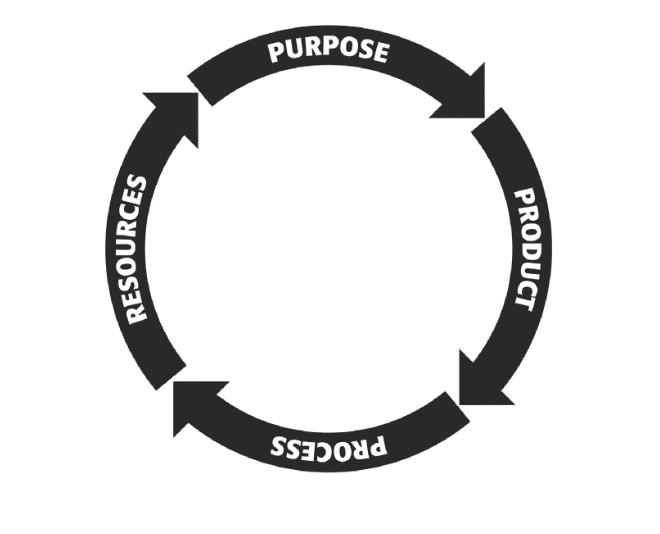As a professional program developer and course creator for Teaching Channel, I’ve discovered a few methods for developing impactful professional learning. When it comes right down to it, developing professional learning is quite a bit like unit or lesson planning, simply on a much larger scale. One of my favorite visuals for this type of work comes from author Barbara Blackburn. Look at the Task Cycle for unit planning below, created for her book, Rigor in the Remote Learning Classroom.

This visual captures the distinct yet iterative process that informs the purposeful development of educational experiences.
The task cycle also works well for planning professional development, so let’s apply it to highlight four considerations when developing professional learning.
- Start with purpose. The purpose, or “why,” of the offering should be used to inform your planning and keep everything nicely aligned. This creates clarity for the learner.
- Consider surveying participants or gathering data from leadership to make sure your offering will meet the learners’ most immediate needs.
- Ask yourself, “Why are you creating this professional development program?”
- Example Response 1: I am creating this professional development program using video coaching so teachers can reflect on their instruction, gain peer feedback, and improve their practice thus positively impacting student learning.
- Example Response 2: I’ve been tasked with developing this training for our 3rd-grade teachers to raise reading comprehension test scores.
- Example Response 3: This offering is being created to assist high school math teachers with the implementation of our new curriculum.
- Use the purpose you’ve identified to visualize, articulate, and operationalize your participant goals.

- Identify, select, or build your product (or assessment) using the purpose and goals you’ve set forth to assess the professional learning that takes place.
- Make sure your product allows the participant to demonstrate new learning and their ability to meet the goals.
- Provide choice when possible. Even adult learners enjoy the opportunity to choose how they will demonstrate their learning.
- When possible, keep it simple, short, and directly aligned back to the goals of the offering.
- Example: Try using video of implementation as an assessment. It allows for purposeful, supportive dialogue focused on the learning goals.
- Plan the learning process by preparing activities that will help the participant reach the goals set forth at the beginning of the session and complete the assessment (product) successfully. As you develop the activities for participants, remember that engagement is paramount.
- First of all, the content must be relevant and useful to adult learners, so ask them how the topic is meaningful to them and/or their students.
- Secondly, make sure learning activities provide opportunities for involvement. Five tricks for more active learning include:
- Movement
- Collaboration and/or discourse
- Use of media/technology
- Choice
- Opportunities for the application of new learning
- Finally, plan the use of questioning. Your questions will be more successful if you plan them and allow for a variety of types. Think about drafting a few follow-up questions as well.
- Consider all of the resources (texts, websites, technology tools, etc.) that both the participant and the facilitator will need to be successful in reaching the objectives of the program you are developing.
- Continue to align resources back to the purpose, product, and process of learning you’ve identified.
- Use multimodal resources to account for different learning strengths and to mitigate challenges.
- Provide more than one resource and allow for choice when appropriate. You may even want to identify a resource you can send as a follow-up to your session.
- Ensure accessibility like transcripts for podcasts or closed captions for video.
Bonus Consideration: Provide time and prompts for reflection following the assessment. Educators know the following quote well.

This quote reminds all content creators about the need to include opportunities for an individual, small group, and large group reflection for increased learning. Additionally, the quote should serve as a reminder to professional development creators and/or facilitators to pause and reflect on the impact of the offerings provided to drive continuous improvement.
What might this look like as you develop a professional learning offering? Leave time at the end of the session, activity, course, and/or day for quiet reflection on individual learning. Use a Turn and Talk to have participants share their thoughts with peers. Provide sentence stems or prompts to help get the ball rolling, and be sure to include an activity prompt for participants to consider implementation and/or next steps for learning. Wrap up your professional learning offering by revisiting the goals shared with the large group.
Planning professional development can be a daunting task, but by using the considerations presented in the Task Cycle, you will be well on your way to meeting the needs of your participants through purposeful, aligned, engaging, and reflective learning.
Recommended Reads:
5 Lessons the Pandemic Taught Us About Professional Development
Moving Video Observations from a Requirement to an Invaluable PLC Staple






